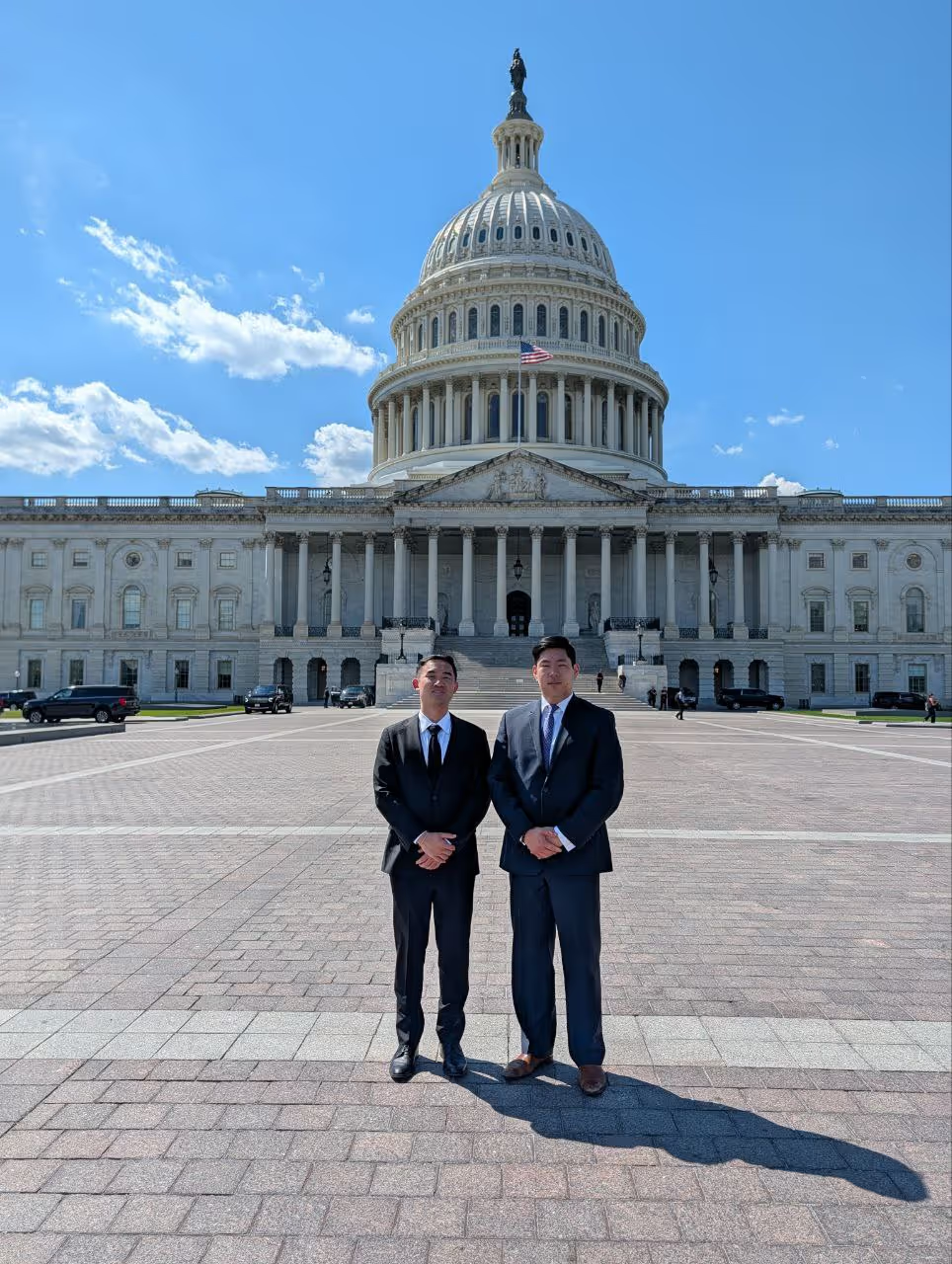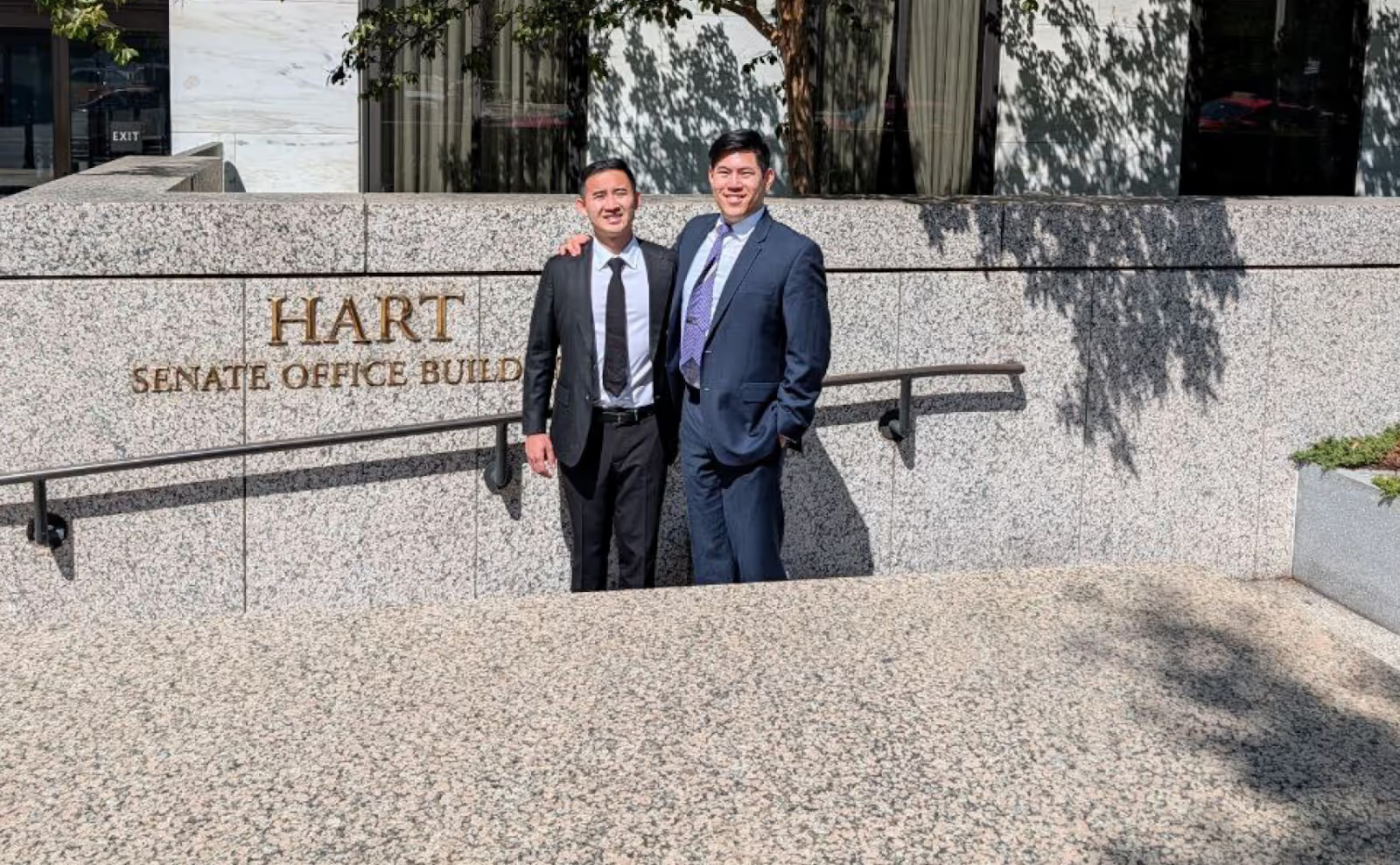.avif)
This month, Plume’s co-founders, Teddy Pornprinya and Chris Yin, along with General Counsel Salman Banaei, traveled to Washington, D.C. to deliver a clear message: the future of capital markets is tokenized, compliant, and open.
In a packed agenda, the team met with senior staff from several Republican and Democratic Senate staff offices, as well as Senate Banking Committee and House Financial Services Committee staff. In addition, we caught up with senior officials at the SEC and US Treasury.
Regulators are actively seeking credible partners who can demonstrate how open blockchains can strengthen U.S. capital markets, extend the reach of the dollar, and lower the cost of capital. We are proud to be helping U.S. policymakers capitalize on a historic opportunity to enhance U.S. competitiveness through smart onchain capital markets policy.
Plume is driving legislation forward on behalf of onchain finance.

Policy Tailwinds for RWAs
Policymakers across parties increasingly recognize the potential of tokenized real-world assets (RWAs) to strengthen U.S. capital markets, expand global distribution of the dollar, and lower the cost of capital for businesses and governments.
Unlike speculative crypto products, RWAs align with the core interests of U.S. financial leadership: growing the role of domestic markets while exporting the U.S. dollar and American capital markets while delivering tangible benefits to businesses and consumers.
We’re already seeing this recognition codified with RWA-friendly regulation.
In July, Congress passed the GENIUS Act, the first federal crypto legislation, creating a national framework for dollar-backed stablecoins. The law requires one-to-one reserves in cash or Treasuries, full BSA/AML compliance, and federal oversight of issuers. As Bloomberg noted, this move “sets regulatory rules for U.S. dollar-backed stablecoins, broadening adoption.” This was a foundational building block for the RWA economy.
Our Message to U.S. Policymakers
Plume welcomes the role of smart policy to facilitate capital formation onchain and to do so in a way that achieves traditional financial regulation policy goals. This means working together with policymakers to craft new, onchain-native ways to protect investors, promote trust in capital markets through rules that reduce risk and promote reliable disclosure, enhance capital formation opportunities for businesses and entrepreneurs, and combat illicit finance.
Plume presented our unique perspective to policymakers: we are the bridge between open, permissionless DeFi and highly-regulated TradFi.
Policymakers are interested in:
- Steps we have taken to build this compliance bridge
- Our thoughts on how to ensure the traditional goals of financial regulation are achieved as finance moves onchain.
How Plume Ensures a Compliant, Public Blockchain
RWAfi is unique among public blockchains in that compliance is embedded in its DNA (or rather, protocol smart contracts). Every transaction on RWAfi is screened to ensure that illicit actors cannot participate.
Through this innovation, we are the first public blockchain that can ensure regulated “financial institutions” can comply with anti-money laundering and sanctions while participating in an open, public, and permissionless blockchain. We spelled out our thoughts in writing to the Senate Banking Committee’s July request for input (RFI) where, among other things we opined that enhancements to combat illicit finance through encouraging (but not requiring) open blockchains with transparent audit trails, digital asset token-level freeze/seize functionality (especially for securities tokens), and protocol-level blacklisting.
How Plume Ensures Policy Goals Are Met
As finance moves onchain, it will rely less and less on intermediaries. This requires a new approach to financial regulation: programmatic compliance. Through new onchain compliance tools like we have incorporated into RWAfi to combat illicit finance, we have a template for programming compliance into the capital markets products that trade onchain: onchain disclosure; automated market and risk surveillance; and the use of onchain records to produce regulatory or audit trail information.
Another area our discussions covered was around the use of public blockchains and permissionless distribution to promote the development in secondary markets to support channelling capital toward underserved communities. Government programs like the Low-Income Housing Tax Credit, Opportunity Zone investments, and Community Development Financial Institutions Fund (CDFIF), among others, rely primarily on large financial institutions even as capital markets elsewhere have evolved to channel private credit sources. Tokenization pours fuel on trends away from relying on big banks for capital that have been growing in TradFi markets for the past decade+.
Streamlined SEC rules around securitization and tokenization, supported by legislation, can enhance liquidity and lower the cost of capital in these markets as they have been demonstrated to do for bond markets. Plume actively supports projects seeking to enhance capital formation in underserved markets, including Purpose for Profit to enhance access to capital for affordable housing projects in the U.S. and the new rules we recommend can unlock opportunity for these communities.
The Road Ahead in Washington
Even as draft bills move through committees, many issues remain unresolved. Plume, because of our unique role straddling the worlds of DeFi and TradFi, has a perspective that punches above our weight.

Our modular, open blockchain is built to accommodate global and national regulations without sacrificing the benefits of permissionless systems.
With 200K RWA holders and 200+ protocols live, it’s clear that Plume is already building the bridge between DeFi and Tradfi and with it, the highways into onchain capital markets.
The future of finance belongs to those who can bridge regulatory compliance and openness.
That future is already here on Plume.
